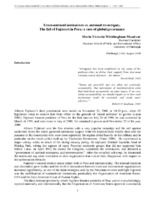| dc.contributor.author | Whittingham Munevar, María Victoria | |
| dc.date.accessioned | 2018-09-02T05:31:14Z | |
| dc.date.available | 2018-09-02T05:31:14Z | |
| dc.date.issued | 2004-11 | |
| dc.identifier.uri | http://cladista.clad.org//handle/123456789/3184 | |
| dc.description.abstract | Alberto Fujimori's third presidential term ended on November 22, 2000, at 10:43 p.m., when 62 legislators voted to remove him from office on the grounds of 'moral unfitness' to govern. Fujimori became president of Peru for the first time on July 28 of 1990. He was re-elected in March of 1995, and once more in July of 2000. He remained in power until November 22 of the year 2000. Two comments regarding these facts, which I repeatedly heard from academics, colleagues, and students, motivated the writing of this paper. | |
| dc.description.abstract | The first was, "Why did it take so long to push Fujimori out of office"; and the second, "It is surprising how quickly and peacefully this regime change occurred, considering the Latin American 'tradition'. | |
| dc.description.abstract | Even though they may seem like conflicting opinions, I do believe that the two comments are accurate when taking into account the perspective used to analyze and understand this historical process. This study presents an analysis of the raise and fall of Alberto Fujimori in Peru to examine the capacity of trans-national and supra-national organizations to mediate in an intra-national conflict, and the changes in the relational patterns among local and global actors. The aim is to contribute in the debate about the possible conflict between transnational institutions and national sovereignty or, as it is often stated, between global and local governance. What makes this case particularly interesting is the fact that the local level opened in two, on the one side the government of Peru, on the other, the citizens resisting and rejecting it. | |
| dc.description.abstract | The most important conclusions that I intend to prove with this case are: Transnational organizations do not necessarily threaten national sovereignty; on the contrary, they often support it, as illustrated by this case; There is an increase in the demand for supra-national authorities and organizations playing a role in local conflicts; There is an increase in the role played by supra-national authorities in national and local conflicts; The increase in access to supra-national authorities and organizations has improved the capacity of local players, both at the individual and organizational level; The power and mechanisms that transnational organizations have need enhancement if we want to move towards real global governance. Transnational organizations need enhancement in order to fulfill their role as representatives of universal values. | |
| dc.format.extent | 26 p. | |
| dc.language | Inglés | |
| dc.publisher | University of Pittsburgh. Graduate School of Public and International Affairs | |
| dc.rights | Creative Commons BY-SA-NC 4.0 Int | |
| dc.rights.uri | http://creativecommons.org/licenses/by-nc-nd/4.0/ | |
| dc.subject | CONGRESO CLAD 9-2004 | |
| dc.subject | GOBERNABILIDAD | |
| dc.subject | DESARROLLO INSTITUCIONAL | |
| dc.subject | SOBERANIA | |
| dc.subject | GOBERNANZA | |
| dc.subject | ANALISIS HISTORICO | |
| dc.title | Trans-national institutions vs. national sovereignty. The fall of Fujimori in Peru: a case of global governance | |
| dc.type | article | |
| clad.congress | Congreso Internacional del CLAD sobre la Reforma del Estado y de la Administración Pública, 9 | |
| clad.key | MFN35524--35524 | |
| clad.key1 | KEY35524 | |
| clad.region | PERU | |
| clad.md5 | df1dc3be426004629a743161953e3dac | |


